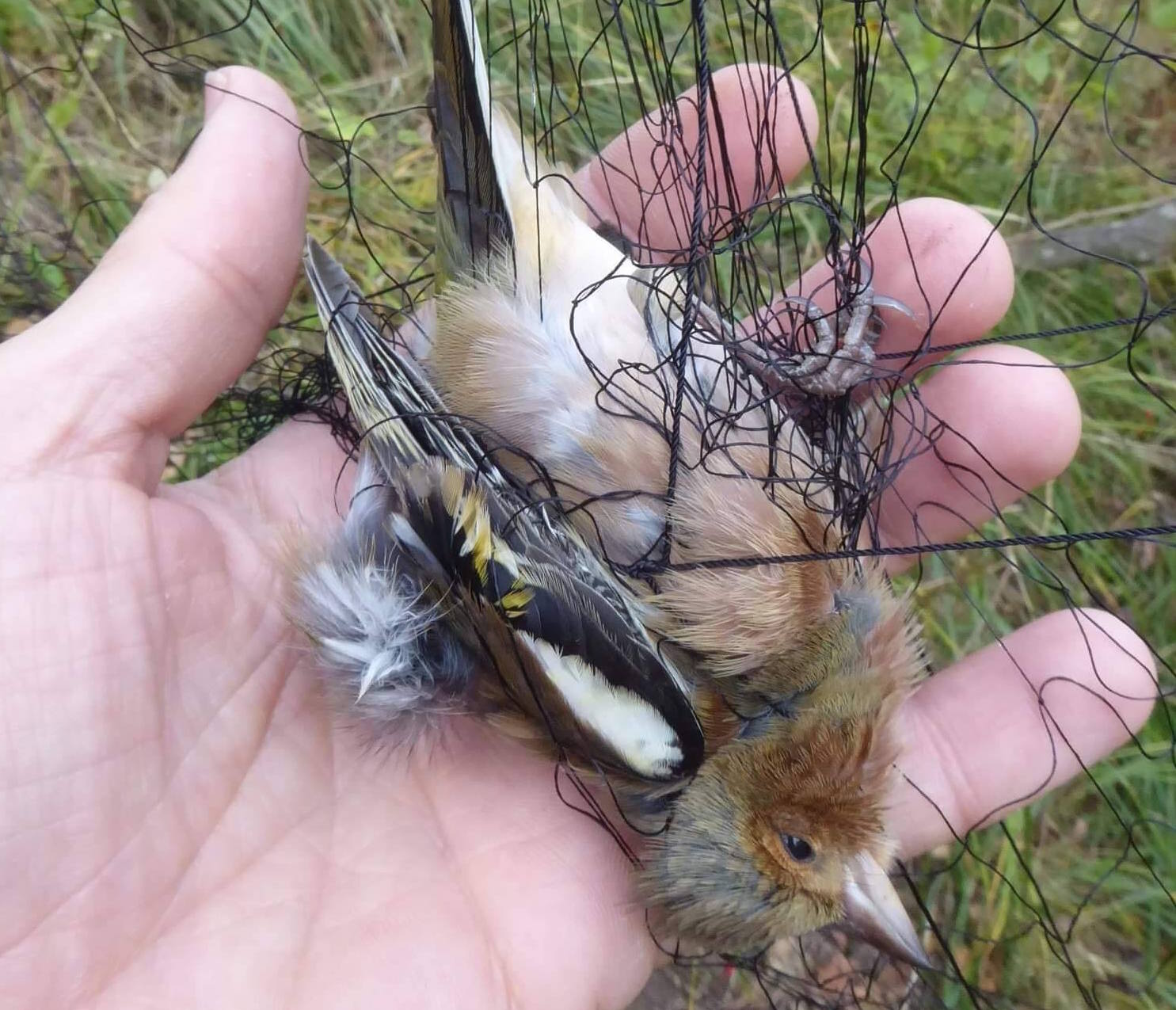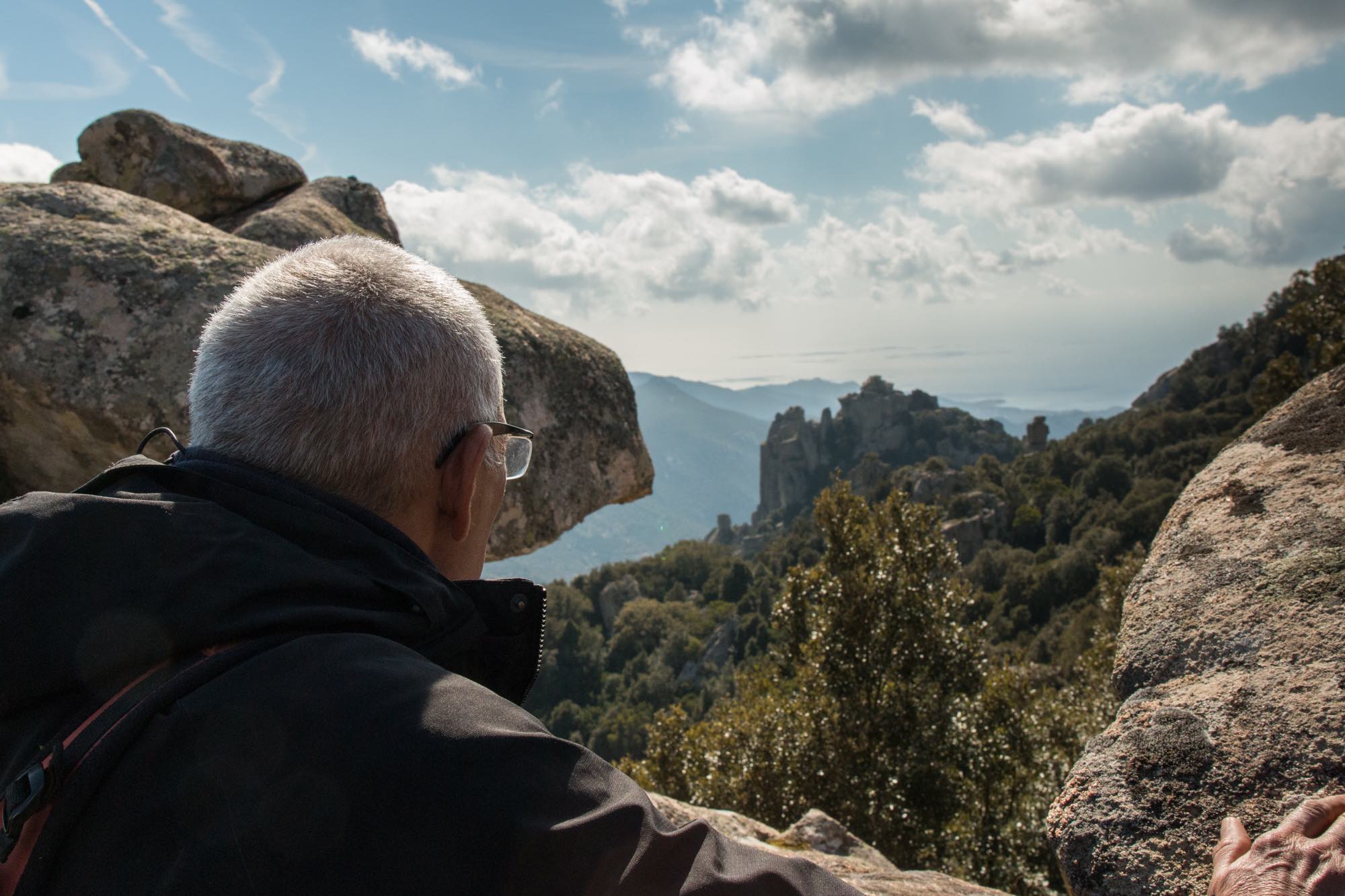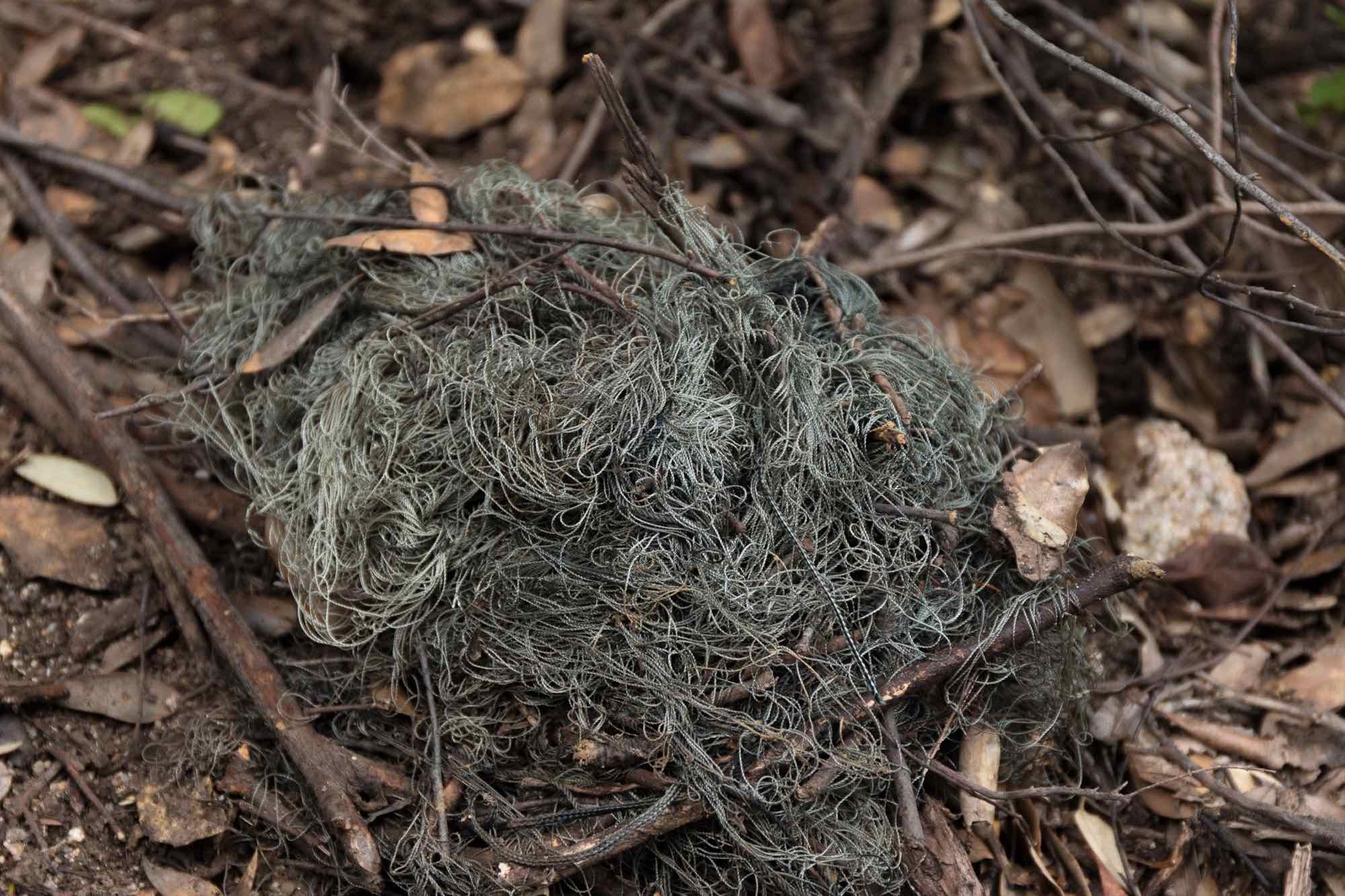
15 May Clipping the wings of Italy’s bird poachers
More than five million birds are hunted illegally in Italy every year – by far the most in Europe. Matteo Civillini investigates efforts to crack down on offenders

An anti-poaching activist from the Committee against Bird Slaughter on the lookout for an illegal bird trapper near Cagliari. Photo: Jacopo Benini
As a choir of songbirds creates a melodic soundtrack, 10 anti-poaching activists are hiding out among dense shrubs in the mountains overlooking Cagliari, a city on the southern Italian island of Sardinia. They’re hoping to spot an illegal bird trapper who’s known to be active in the area.
“This guy is like a Swiss clock,” says Giovanni Malara, the team’s leader. “He checks his nets and heads back at exactly the same time every day.”
Moments later, a turquoise motorbike comes racing down a narrow dirt road. “That’s him,” Malara exclaims. Now the second part of the operation – finding his bird traps – begins.
The activists, members of the Committee Against Bird Slaughter (CABS), a conservation organisation that conducts anti-poaching operations, fan out to check the motion-sensor cameras they’d hidden the day before. They hoped images from the cameras would point them to the path used by the alleged poacher to reach his trapping sites.
The activists would then search the ground for clues – footprints, shreds of fabric – that would lead them to the “mist” nets he’d placed to snag birds in flight. Typically suspended between two poles, they’re called mist nets because they’re made of thread so fine that birds don’t see them.
On that day in February 2019, the CABS team failed to locate the trapping stations. But two days later, as more clues emerged through their on-the-ground activities, they found 28 nets. Malara says the evidence was handed over to the local police, who are continuing the investigation.
According to research by Birdlife International, a global partnership of bird conservation groups, more than five million birds are hunted illegally in Italy every year – by far the most in Europe. Many are killed immediately and eaten in traditional dishes.
Others, especially songbirds, are kept alive and smuggled abroad, where they’re sold as pets or as bait birds for further trapping activities, as on the nearby Mediterranean island of Malta and its tiny neighbour, Gozo.

Confiscated bird nets. Poachers lock songbirds in cages and place the cages around their mist nets as lures to attract any finch that flies by. Photo: Jacopo Benini
Insidious crime
Trapping birds “is an insidious crime committed by people with different sets of motivations,” says Stefano Testa, head of Soarda, the anti-poaching unit of Italy’s Carabinieri military police. “You can find anyone from the small-scale hobbyist to those trying to provide an income to their families and, finally, to the large criminal organisations that earn huge amounts of money with fewer of the risks associated with other illicit activities.”
The problem is so acute that in 2017 the Italian government launched an action plan to tackle crimes against bird species. Last year the task force responsible for coordinating enforcement operations, led by Testa, contributed to the seizure of more than 5,000 protected birds – alive and dead – and the referral of 200 people to prosecuting authorities.
But crime-fighting resources are limited, Testa says, and as a result, environmental groups such as Malara’s CABS team constitute a vital front line in anti-poaching efforts.
“We can’t be everywhere, and they can offer us additional sets of trained eyes on the ground,” Testa says. “Only through the cooperation of local authorities and civil society groups are [we] capable of achieving lasting results.”
Malara has devoted most of his 67 years to chasing bird trappers. “It is cruel activity,” he says. “When they’re hunted for food, birds are left to die in the nets or have their heads crushed by the poacher.”
Malara says it wasn’t only the birds’ fate that motivated him at first. “I was appalled by the general denial over the mere existence of such a glaringly illegal activity,” he says.
Evidence collected through his dogged efforts has formed the backbone of several judicial probes. One recent case stands out: a series of petitions from Malara triggered a police investigation that laid bare a lucrative new smuggling route for finches caught in southern Italy.
Finches are prized for their colourful plumage and for their chirping abilities. Through a mixture of soft twittering and rapid, high-pitched trills, these songbirds can create a wide range of melodious sounds.

Chaffinch caught in a mist net. Illegal hunting of finches has become so intensive in Malta that only a handful of the birds now breed there. Photo: CABS
The Malta connection
A tiny dot on the map, Malta has one sanctioned bird-trapping season, which generally runs from October to December, and more than 6,400 registered trapping stations. But trappers are also known to operate illegally during the northward spring migration of birds, from February to April.
Until last year, trapping finches in the autumn was legal. But following a new ruling by the European Court of Justice, only two species – the golden plover and the song thrush – can now be hunted legally in Malta. The court noted in its judgment, citing a Birdlife International study, that illegal hunting of finches has become so intensive in Malta that only a handful of the birds now breed there.
As a result, says Nicholas Barbara, conservation manager at Birdlife Malta, “there is always a huge demand for finches from Italy”. Local poachers lock the illegally imported birds in cages and place the cages around their mist nets as lures to attract any finch that flies by.
In May 2018 Italian police cracked down on an organised network responsible for trafficking tens of thousands of finches to Malta. The indictment describes a well-oiled enterprise.
First, Maltese wholesalers placed large orders for finches with the boss of the Italian poaching group. The poachers then caught the agreed number of birds in dozens of mist nets and prepared them for shipping.
Wiretapped conversations reveal how the smugglers relied on complicit veterinarians, who allegedly attached falsified metal rings to the legs of the birds and supplied documents certifying that they were born in captivity.
The finches were then ferried across the short stretch of sea to Malta, adopting a trick smugglers sometimes use to ferry illegal drugs along the same route: the birds were stashed in plastic containers hidden in specially modified vehicles with double bottoms and covered with produce, typically seafood. Italian investigators documented how designated bird couriers travelled several times a year on the ferry linking the port of Pozzallo, in Sicily, to Malta’s capital, Valletta.
Finches are among the more than 500 wild bird species protected under the European Union’s Birds Directive (the most recent version of legislation originally adopted by the union in 1979), which sets protection protocols based on the conservation status of each species.
When Malta joined the EU in 2004, it was required to integrate the directive into its national legislation, but according to Birdlife Malta and CABS, successive Maltese governments have been lax in preventing trapping. In June 2018, the European Court of Justice ruled that Malta had breached the directive by introducing too many exemptions and by failing to carry out adequate enforcement activities.
Malta’s Ministry for the Environment did not respond to interview requests.

Malta is a tiny dot on the map below Italy, but conservation groups believe that as long as bird trapping continues to be tolerated there demand for live bait birds will keep poachers active in Italy. Map courtesy Google maps
‘Nothing has changed’
In October 2018 Malta, reacting to the June ruling, repealed its regulations for the autumn live-capturing of finches and allowed trapping only of golden plovers and song thrushes. But this spring, Birdlife Malta and volunteer anti-poaching patrols with CABS scouring the island for illegal activity reported little sign of enhanced enforcement during March, the peak month when finches migrate through Malta on their way to mainland Europe.
“Nothing has changed,” Barbara says. “Trapping is totally forbidden, but on an almost daily basis we have been out on patrol, [spotted] illegal trappers, and reported them to police. This includes people operating at an industrial scale that we have already taken to court multiple times.”
On March 19 2019 two German CABS activists perched on a vantage point are using a telescope to monitor activity in a narrow valley sloping toward the Mediterranean. An aerial survey days before had revealed patches of cleared terrain dotted with small mudbrick huts, where hunters wait for birds to fly into their nets.
“This is a paradise for poachers,” says Alex Heyd, one of the spotters.
Moments later their suspicions are confirmed as a man, unaware that he’s being watched, dashes out of a hut, kneels on the ground and starts collecting what appear to be birds from a net.
“We got him,” Axel Hirschfeld, the other spotter, shouts out, reaching for his cell phone to call the Malta police.
A police patrol unit arrives and, after inspecting the area, approaches the suspected trapping site. As soon as the police car comes to a stop, chaos ensues. Three other men emerge out of nowhere and, with the first man, start frantically gathering up their equipment. Then they scatter across the valley.
With a sense of urgency, the officers start running – in the wrong direction.
“Unbelievable,” Hirschfeld cries out. “Where the hell are they going?”
By the time the three policemen reached the site, the alleged trappers had disappeared. According to Hirschfeld, three suspects were stopped hours later, questioned and charged by police with illegal trapping of protected species.
They will be summoned to court for a preliminary hearing at a later date. Malta Police did not respond to questions about this incident or finch trapping in general.

The clampdown on organised bird smuggling networks is using more effective tools such as wiretapping and motion-sensor cameras. Photo: Jacopo Benini
Uneven punishment
In December 2018 the court in the southern Italian coast city of Reggio Calabria found seven Italian men and one woman guilty of conspiracy to carry out illicit wildlife trading activities and of fencing stolen property – in other words, smuggling tens of thousands of finches to Malta and northern Italy, according to the judgment.
Judge Pasquale Laganà handed them jail sentences totalling 20 years. Francesco Repaci (70), the suspected boss, got the most – four years.
Bird protection groups in Italy hailed it as a landmark judgment, in stark contrast to the token fines previously levied in the overwhelming majority of bird poaching cases.
“It’s the first time that an Italian court upholds a charge of conspiracy in relation to a bird poaching case,” Giovanni Malara says. “This is important not just because the penalties for the convicted felons are higher, but also because we hope that from now on more prosecutors will be able to carry out in-depth investigations using more effective tools, such as wiretapping.”
But the outcome of the Maltese end of this operation was starkly different. Italian investigators tracked down the man they believed to be one of the most prolific Maltese buyers of finches: Albert Satariano (65). A retired diamond cutter, Satariano was a self-described trapping enthusiast until the practice was largely outlawed last year.
Police wiretapped a series of conversations between Satariano and the convicted Italian traffickers which, according to the indictment, were allegedly made to “agree on the quantity of live birds to trade and the manner in which to carry out the exchange”.
The indictment also alleges that Satariano had a series of encounters with members of the smuggling ring. By cross-checking passenger lists on the ferry from Malta and data from highway toll booths, police say that whenever Satariano travelled to the port of Pozzallo, vehicles belonging to the smuggling groups were detected there.
On one occasion, in late November 2016, after meeting with Francesco Repaci’s son, Pasquale, Satariano was recorded by police asking about a “receipt”. Repaci replied that he would call him back and spell out its contents to him.
A few minutes later, in another wiretapped conversation between the two, the Italian started listing numbers of different bird species. “So write it down,” Pasquale allegedly told Satariano, “840 serins, 570 goldfinches… 110 greenfinches… 20 linnets.” Investigators suspected the numbers referred to the birds exchanged in that meeting.
A few weeks later police wiretapped another conversation, in which, they allege, Satariano and Repaci talked about the challenges of getting birds to Malta because Italian customs officers were ramping up checks.
Satariano strongly denies being involved in acquiring birds smuggled from Italy. “I used to be active in importing birds from Belgium, but I stopped 20 years ago,” he says. “I was never offered birds in Italy, and I would never import birds from Italy.”
Satariano admits buying birds from the network led by Repaci but, he says, the exchanges occurred in Malta. “I was never aware the birds came from an illegal source. Repaci used to say that they’d been bred and not caught in the wild.”
Satariano also says he’s been acquainted with Repaci’s family for many years and described the 2016 meetings as encounters between old friends. The receipt mentioned in the wiretapped call, he says, “probably referred to a consignment of birds that they’d already shipped to Malta and offered me to buy. But after considerations, I declined as I did not want to get involved.”
Satariano, who says he found out about the allegations by the Italian investigators only after he was contacted for this story, has been unscathed by the Italian probe. Italian authorities say they would need the cooperation of their Maltese counterparts to bring him, or any other alleged Maltese buyer, to justice.
Stefano Testa, who coordinated the investigation in Sicily, says intelligence on the case has been passed via Europol, the law enforcement agency of the European Union, to the Malta police. At this stage, it’s unclear what kind of action on this case is being taken by Maltese law enforcement.
Conservation groups believe that as long as trapping continues to be tolerated in Malta, demand for live bait birds will keep poachers active in Italy. For BirdLife Malta’s Nicholas Barbara, only genuine political will to stamp out illegal activity can put an end to the trade.
But, he says in a deflated tone, “I don’t see this happening anytime soon. We often feel we’re fighting this battle alone. If we stop policing the territory ourselves, no one else will do that. It would be a disaster.”
This article was published by National Geographic here, and was supported by a grant from the Internews Earth Journalism Network
